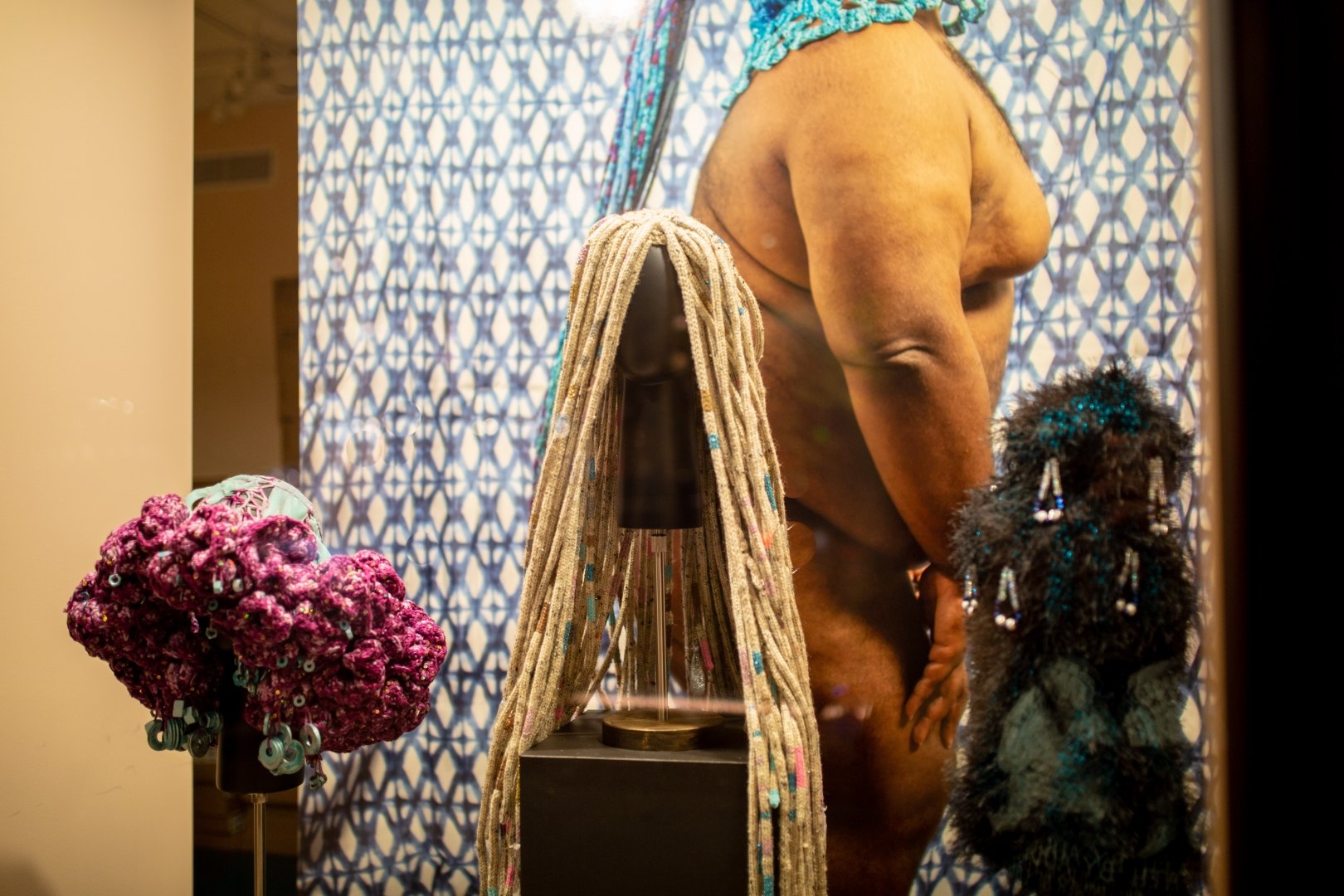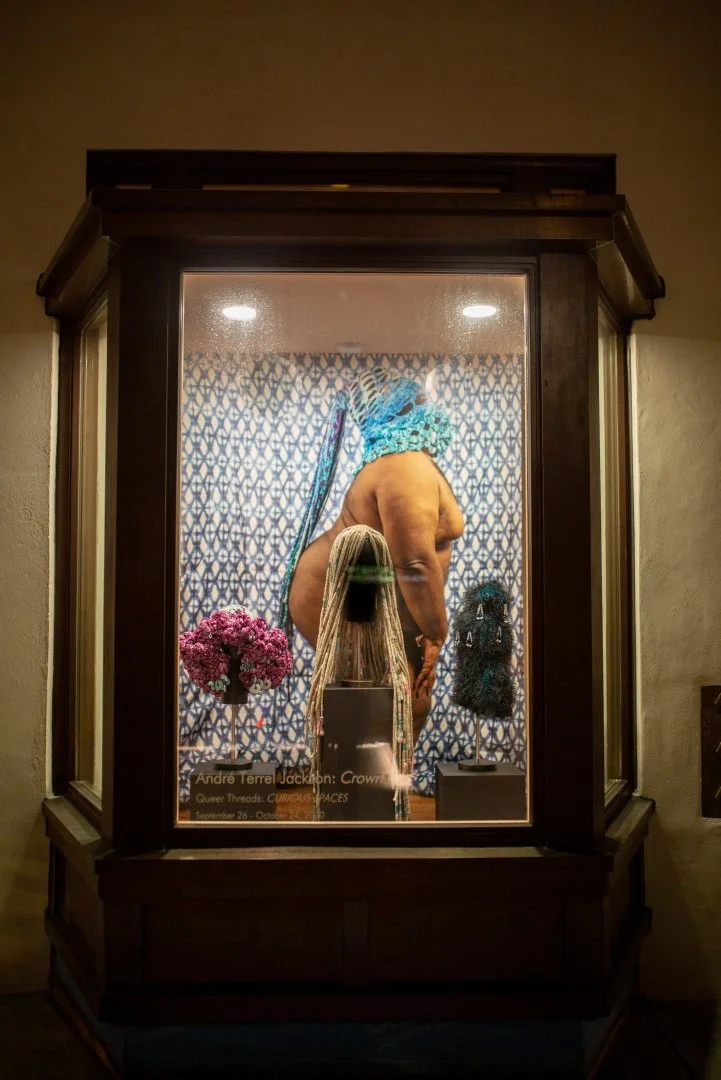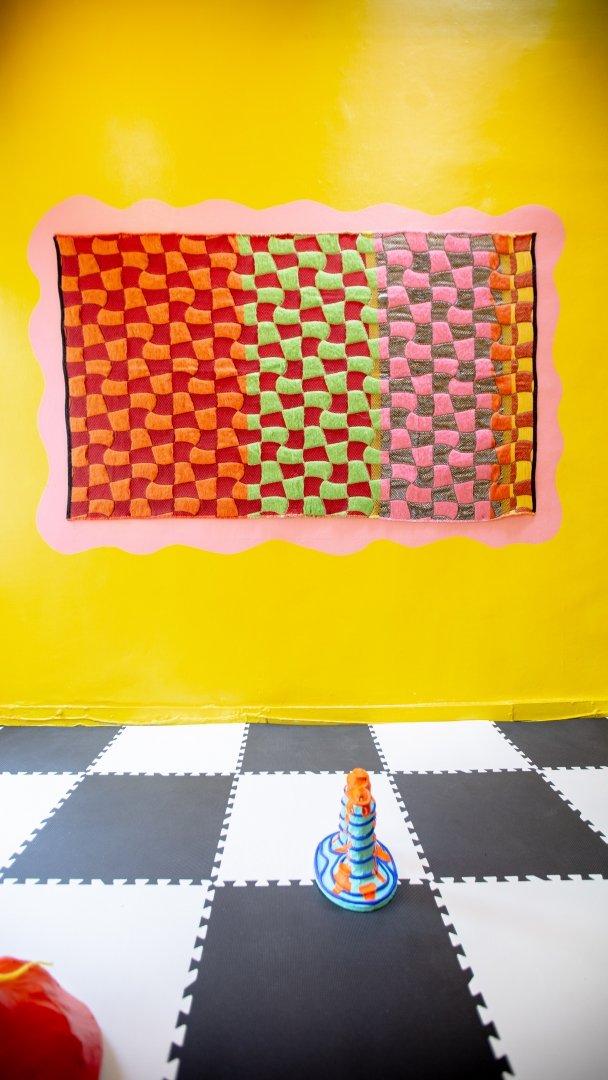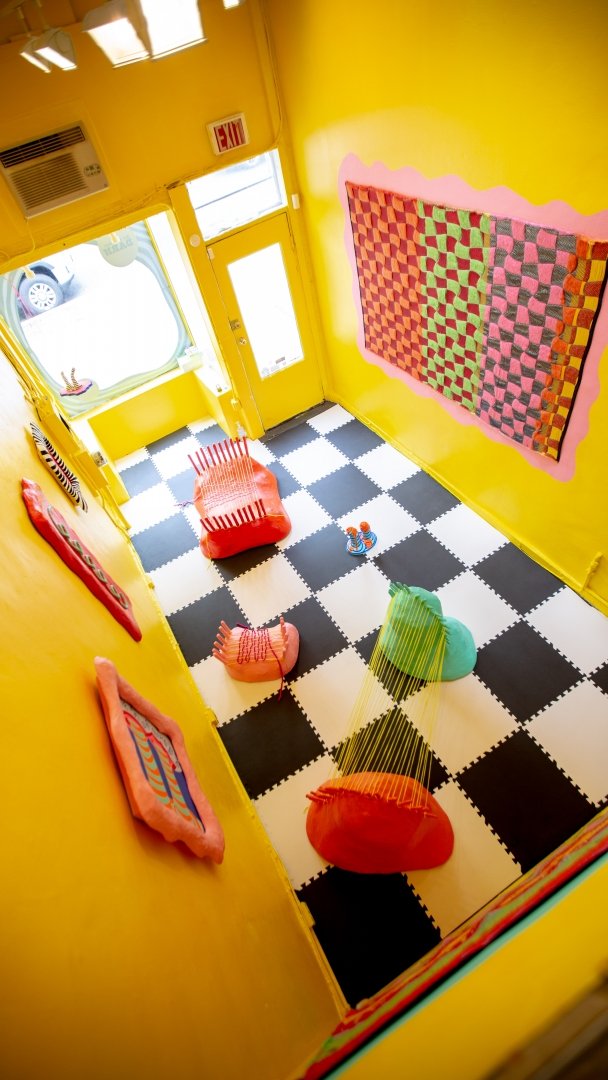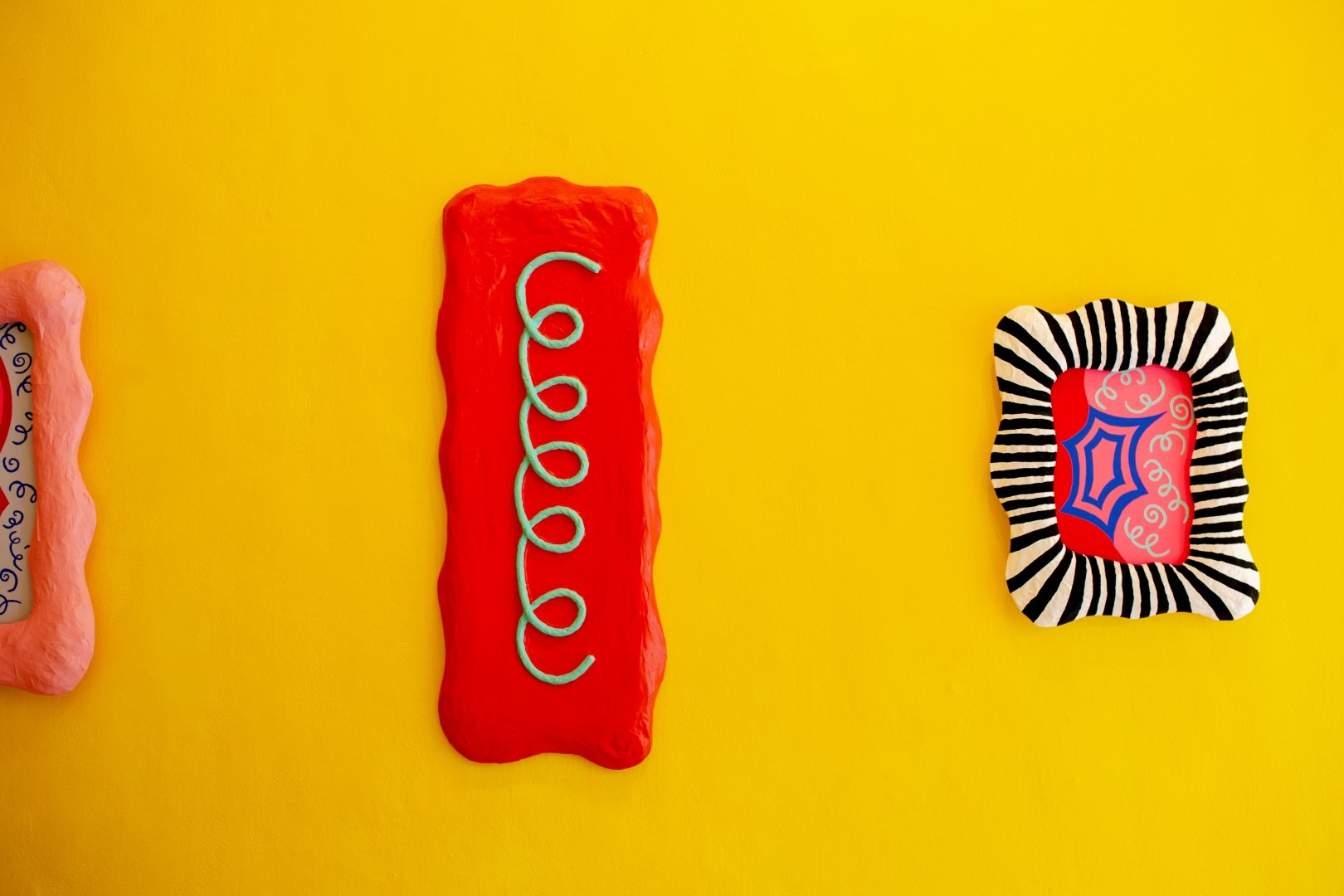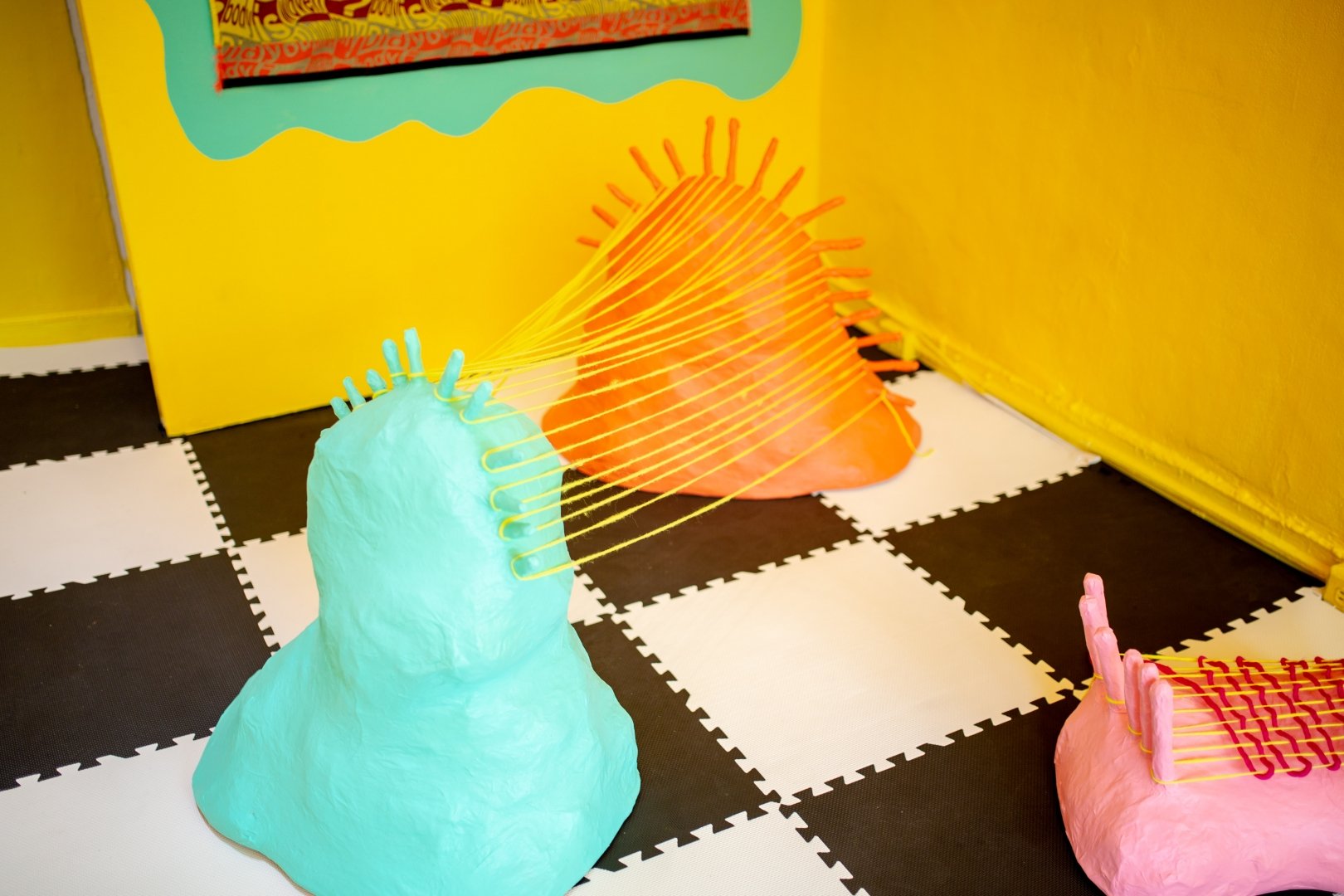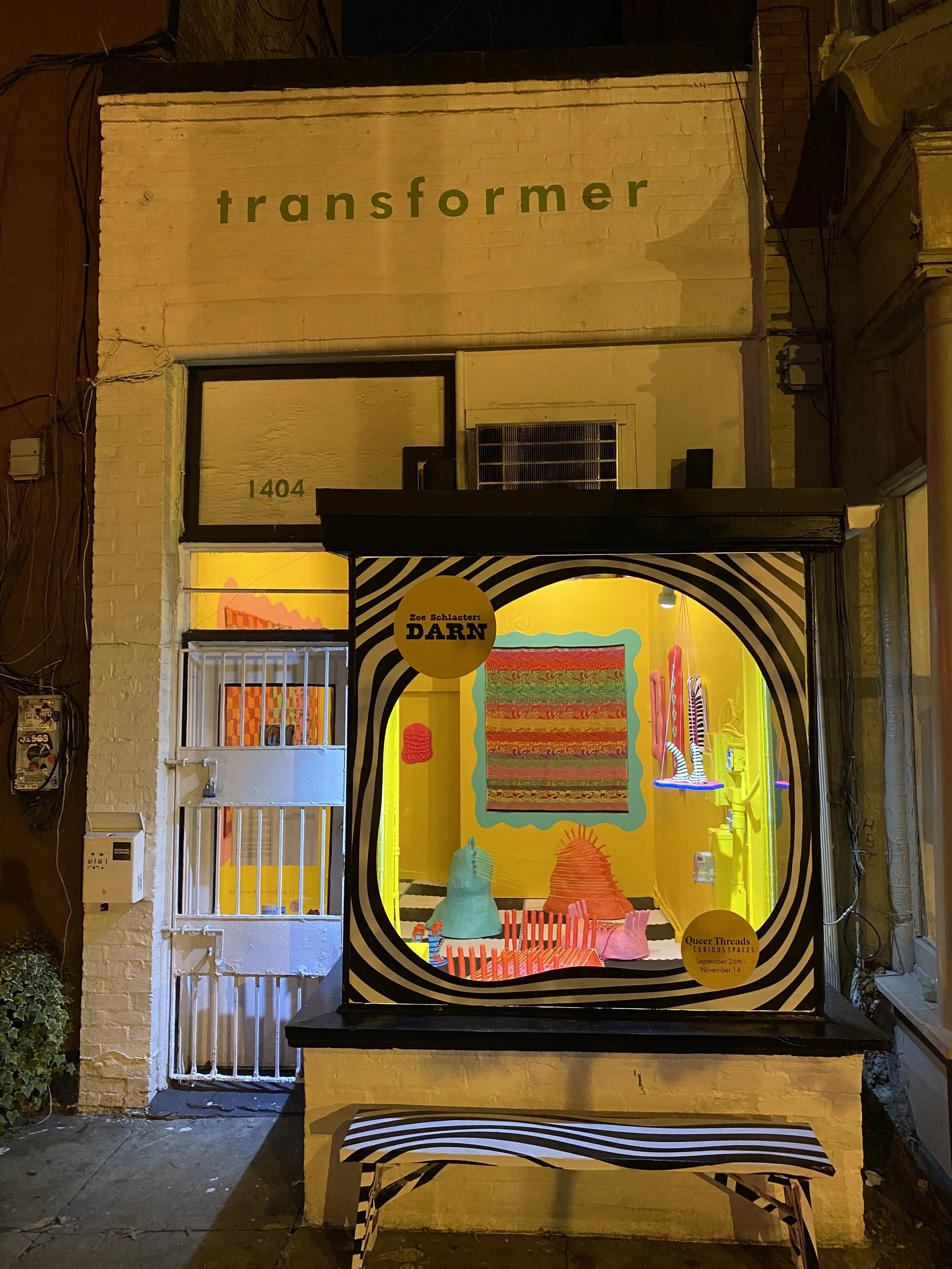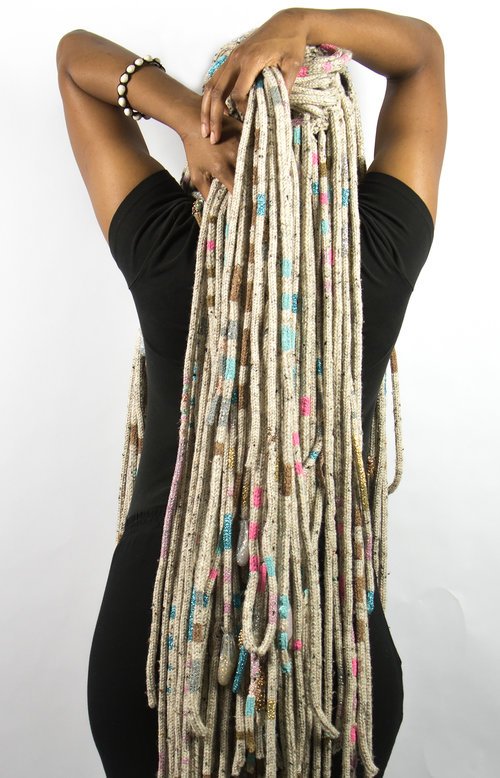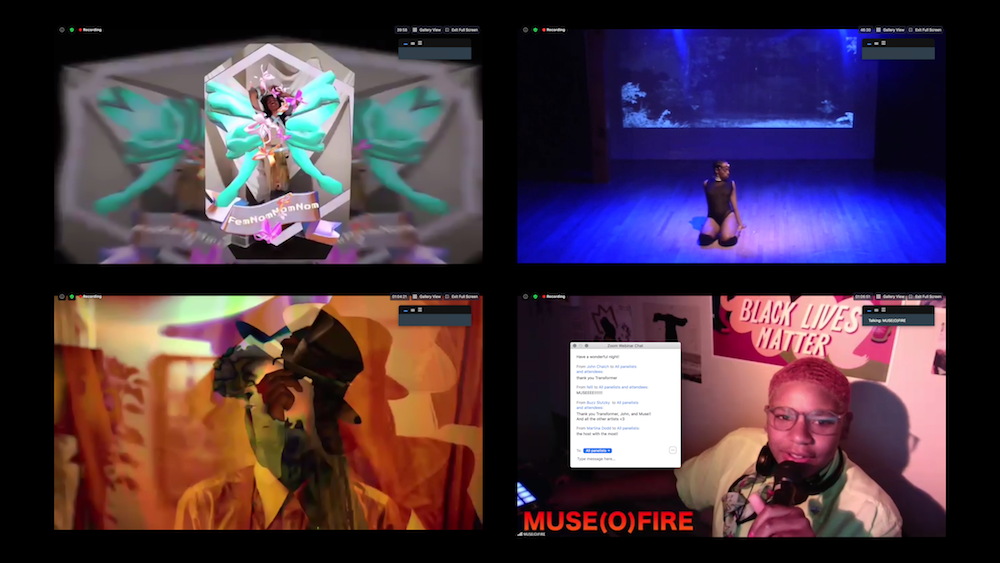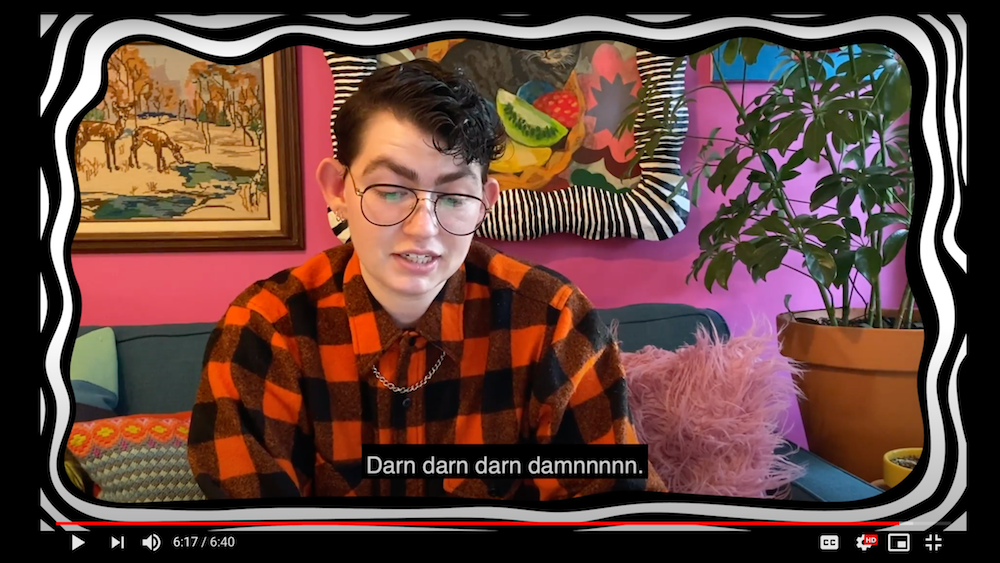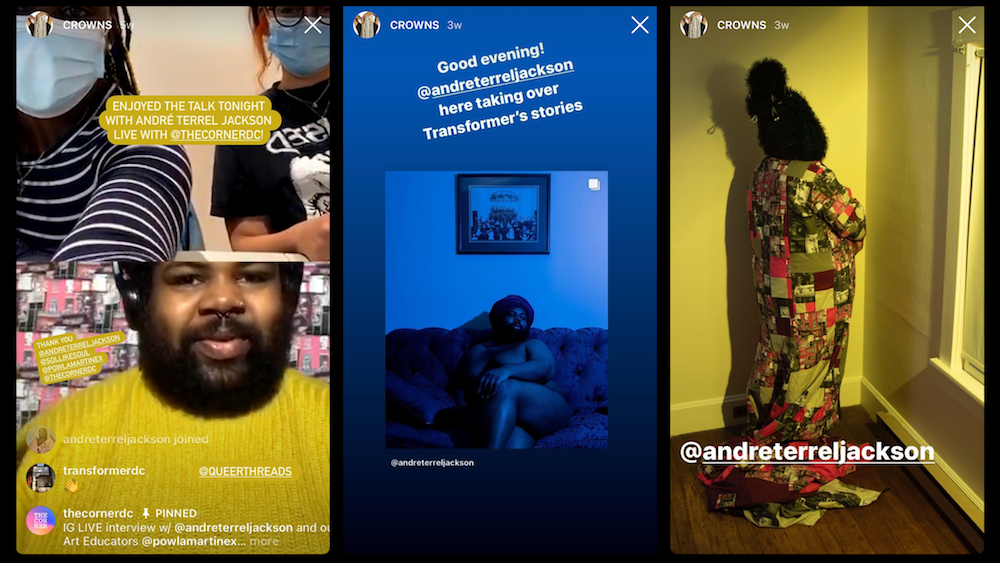Queer Threads: CURIOUS SPACES
September 26 – November 14, 2020
Transformer proudly presents Queer Threads: CURIOUS SPACES – an exhibition collaboration exploring how artists are remixing fiber and textile traditions to explore contemporary LGBTQ+ identities and ideas.
Featuring solo installations by Zoe Schlacter & André Terrel Jackson and programming hosted in collaboration with The Corner at Whitman-Walker, The George Washington University Museum & The Textile Museum, and American University’s Fine Art Department & The American University Museum.
PRESS
Eight Digital Exhibition Spaces for the Second-wave Lockdown -Hyperallergic
Queer Threads: CURIOUS SPACES Gives Queerness Curb Appeal -Washington City Paper
Transformer Queer Threads Reflects on Identity -District Fray
Transformer unveils Queer Threads exhibits -The Washington Blade
8 Things To Do This Week In DC (And Beyond) -Metro Weekly
Images by Farrah Skeiky.
Organized by Transformer and Queer Threads curator John Chaich, Queer Threads: CURIOUS SPACES features solo artist installations by emerging queer artists, Zoe Schlacter at Transformer and André Terrel Jackson at The Corner at Whitman-Walker. Additional online programming presented in partnership with guest artists, The George Washington University Museum & The Textile Museum, and American University’s Fine Art Department & The American University Museum. Queer Threads: CURIOUS SPACES is supported in part by an award Transformer received from The National Endowment for the Arts.
Queer Threads: CURIOUS SPACES celebrates the six-year anniversary of Queer Threads — an evolving exhibition, initially presented at the Leslie-Lohman Museum of Art, and full-color, coffee-table book, curated by John Chaich, that spotlights an international, intergenerational mix of contemporary artists exploring queer identity by remixing fiber craft traditions. The Washington, DC presentation of Queer Threads: CURIOUS SPACES celebrates Transformer’s ongoing collaboration with curator John Chaich, and seeks to engage and expand audiences for inventive and evolving visual expression. As social distancing continues to refine exhibition experiences, audiences will engage with works through each venues’ glass doors or windows.
“Queer Threads: CURIOUS SPACES calls on the haptic power of fiber & textile to curiously reveal the textured spaces that queer lives are boldly and sensitively claiming today,” notes Chaich. “Given the common urge to touch fiber & textile, viewing Schlacter and Jackson’s colorful work through street-front windows evokes a curio cabinet, retail window, terrarium, or circus sideshow. There’s an exhibitionistic/voyeuristic pleasure in viewing fiber art this way.”
Zoe Schlacter, Darn, 2020, solo installation at Transformer. Image by Farrah Skeiky.
André Terrel Jackson, Crowns, 2020, solo installation at The Corner at Whitman-Walker. Image by Farrah Skeiky.
ZOE SCHLACTER
DARN
September 26 – November 14, 2020
Transformer
1404 P Street NW
Visible like a diorama through Transformer's storefront window, Zoe Schlacter invites us into an exuberant, stylized, textured world. In this site-specific installation, the Brooklyn-based, Nashville-raised artist embraces everyday craft materials, reimagines traditional textile mechanisms, and celebrates the queer, creative impulse. Yarns extend from hand-made, wall-mounted, loom sculptures as paper mâché sculptures and fabric paintings dart across the floor. Referencing the playfulness of Memphis design and plasticity of objects of art and pleasure, Schlacter employs the sharpness of graphic design to wink at the perception of sexually graphic content. Through negative and positive space, they explore ideas of (w)holeness, visibility, and mending. Trans/forming the gallery by deconstructing the language of weaving, Schlacter embraces the potentiality of queer identity, style, and connection through fiber, form, and space.
Image: Storefront view of Zoe Schlacter, Darn, at Transformer, 2020.
ABOUT THE ARTIST
Zoe Schlacter is an interdisciplinary artist and designer living and working in Brooklyn, New York. Schlacter earned their BFA in textiles from the Rhode Island School of Design, where they learned both traditional crafts and contemporary design skills.Through weaving, quilting, sculpture, and installation, Schlacter’s work explores weaving as theory and practice, gendered expressions of personal style, and the creative potential of trans sexuality. Schlacter’s practice maintains a central question-- How does one mediate a trans body? Through textiles? Sex toys and prosthetics? Code switches and signifiers? Schlacter seeks to reconcile this question through open ended play and gaiety. Formally, Schlacter’s work strives for ambiguity: it straddles the line between representational and non-representational. Their work draws from a range of aesthetic sensibilities, including conventions of the Op Art movement, as well as Western textile pattern traditions. In addition to their art practice, Schlacter works as a textile designer, primarily designing children’s home goods and apparel. Across disciplines, Schlacter aims to make work that is bold and celebratory, prioritizing the viewer’s experience of visual pleasure. Schlacter was a Fellow in the 2017-2018 Queer|Art|Mentorship, and has exhibited solo shows at Spring/Break Art Show (2018) and Elephant Gallery in Nashville, Tennessee (2019).
http://www.zoeschlacter.com/
André Terrel Jackson
CROWNS
September 26 - October 24, 2020
The Corner at Whitman-Walker
Community Window at 1377 R Street, NW
Crowns celebrates Black, female-identified cultural icons as source of inspiration and identification for femme-presenting, BIPOC queer communities. Mx. Jackson has created a royal court of crowns fit for queens in a triptych of hand-crochets headpieces inspired by Nina Simone, Venus and Serena Williams, and Alice Walker and influenced by the elaborate church hats and decorative hairstyles they grew up idolizing. The artist transforms hardware into jewelry and rope into yarn to create the headpieces' flowing and undulating forms recalling braids, plaits, twists, and beads. The headpieces serve as both art objects and functional fashion, as seen in the nearly life-sized self-portrait also on view. Through the texture of the fibers and confidence of the model, the portrait demands visibility for the Black, queer body. Fittingly displayed within walking distance from the National Archives for Black Women's History at the Mary McLeod Bethune Council House in DC, this installation celebrates Black creativity, femme energy, gender nonconformity, and body positivity.
Image: André Terrel Jackson, Crowns, 2020, solo installation at at The Corner at Whitman-Walker. Image by Farrah Skeiky.
ABOUT THE ARTIST
André Terrel Jackson is interested in the individual experiences that add up to create social, political and cultural groups. Mining personal history, the artist is able to use poetry, weaving, sculpture, apparel and performance to spark conversation about difficult issues related to identity. Jackson is Inspired by the work of artists from Sonya Clark and Nick Cave, Melina Matsoukas, Marlon Riggs and Tarrel Alvin McCraney; to musicians like Cakes Da Killa and Solange, Beyoncé and Janelle Monáe; to scholars like Kimberlé Crenshaw and Amelia Jones, and bell hooks; to writers like Essex Hemphill and Joseph Beam. André uses language, visual/literal/metaphorical, to center the voices and images of blackness. Intersectionality is paramount, and influences the use of materials, which take the artist from the craft store, to the hardware store, from the quirky, to the fine and luxurious. The mixing, and juxtaposing, of materials lend humor and beauty to otherwise grave topics. Jackson received a BA in Fashion from Albright College and an MFA in Fibers from Savannah College of Art and Design. https://www.andreterreljackson.com/
Image: André Terrel Jackson, Williams, 2017
Queer Threads: Expanded Views Artists Talks
Presented by American University's Fine Art Department
Via Zoom | Register Here
T.J. Dedeaux-Norris | Thursday, September 17, 6pm
Paolo Arao | Thursday, October 1, 6pm
Oliver Herring | Thursday, October 15, 6pm
Sheila Pepe | Thursday, October 29, 6pm
Angela Hennessy | Thursday, November 12, 6pm
American University’s Fine Art Department presents a series of lectures by past, present, proto, and future Queer Threads artists: Paolo Arao, Angela Hennessy, Oliver Herring, T.J. Dedeaux-Norris, and Sheila Pepe. A queering of mediums, each of their practices uniquely merges fiber-based crafts with painting, sculpture, and installation. These lectures will provide a glimpse into studio practices that defy formal expectations and question the function of identity in the making and circulating of art works. Visit https://www.american.edu/cas/studio/visiting/ to register and for further details.
Image Collage of Artworks by Featured Artists in the Queer Threads: Expanded Voices Artist Talk series hosted by American University’s Fine Art Department & The American University Museum. 1- T.J. Dedeaux-Norris, Nina Simone (Mississippi Goddam, 1968), 2019. 2- Paolo Aaro, Evolving Quilt Project (ongoing). 3- Oliver Herring, Untitled (A Flower for Ethyl Eichelberger), 1991-92, 4- Sheila Pepe, Your Granny's Not Square, 2008, 5- Angela Hennessy, Black Rainbow, 2017.
Queer Threads: Past, Present, Future
Tuesday, October 6, 6pm
Presented by The George Washington University Museum and The Textile Museum in collaboration with Transformer
Via Zoom | Register Here: https://www.eventbrite.com/e/120404925373
Just what’s so queer about threads? The traveling exhibition and coffee table book, Queer Threads, has been committed to exploring contemporary fiber and textile practices by LGBTQ+ artists. In this slide lecture, curator John Chaich will explore the conceptual framework guiding Queer Threads group and solo exhibitions since 2014, reflect upon critical questions raised as the project has evolved, and preview its 2021 iteration at the San José Museum of Quilts and Textiles. Presented by The George Washington University Museum and The Textile Museum in collaboration with Transformer.
Queer Threads: Curious Cabaret
Tuesday, October 13, 7-8pm
Presented by Transformer
Via Zoom | Register Here: https://www.eventbrite.com/e/120422971349
An evening of readings and performances inspired by the multi-venue exhibition Queer Threads: Curious Spaces. Featuring artists Moréna Espiritual, André Terrel Jackson, Armando Lopez-Bircann, Felli Maynard, Buzz Slutzky, and Juh Weems. This program is organized by Transformer in collaboration with artist Muse Dodd, Queer Threads: Curious Cabaret contributing curator, technical producer, DJ & Host.
Image collage of performances for Queer Threads: Curious Cabaret: Screenshots of 1 - Museofire hosts Queer Threads: Curious Cabaret event on Zoom. 2 - André Terrel Jackson performance, Reverence. 3 - Buzz Slutzky performance, Clothes Feelings. 4- Juh Weems performance, black pleasure, play and rest as radical.
Image collage of performances for Queer Threads: Curious Cabaret : 1 - Armando Lopez-Bircann performance, FemNomNomNom. 2- Moréna Espiritual performance, an ode to the parts of me i wish to mourn. 3- Felli Maynard performance, Primp. 4- Museofire hosts Queer Threads: Curious Cabaret event on Zoom.
Queer Threads: Fresh Voices
Tuesday, October 20, 6-7pm
Presented by The George Washington University Museum and The Textile Museum in collaboration with Transformer
Via Zoom | Register Here: https://www.eventbrite.com/e/120407346615
A conversation with curator John Chaich and artists André Terrel Jackson and Zoe Schlacter exploring how queerness informs their thread-based fiber practices and works on view at The Corner at Whitman-Walker and Transformer. Moderated by Caroline Kipp, Curator of Contemporary Art at The Textile Museum, and Victoria Reis, Executive & Artistic Director of Transformer. Hosted by The George Washington University Museum and The Textile Museum in collaboration with Transformer.
Screenshot from Queer Threads: Fresh Voices Artist Talk featuring Queer Threads curator John Chaich discussing Crowns. Hosted by The George Washington University Museum and Textile Museum. Image by Transformer.
Screenshot from Queer Threads: Fresh Voices Artist Talk featuring Queer Threads curator John Chaich discussing Darn. Hosted by The George Washington University Museum and Textile Museum. Image by Transformer.
Queer Threads: Mending 101
Tuesday, October 27, 7-8pm
Presented by Transformer
Via Zoom | Register Here: https://www.eventbrite.com/e/122560705369
“Mending 101”, led by Sew Queer DC’s creator Molly Stratton and fellow mender Kat Brenowitz, will be a live skill-share event on how to fix some of the most common clothing snafus. The duo will talk about re-sewing buttons, patching, hemming and de-mystifying zippers. Using a combo of lecture and live demos, this “Mending 101” class will teach you everything you need to know to get started creating your own sewing kit and DIY-ing your own mends.
Follow @transformerdc on Instagram throughout the duration of Queer Threads: CURIOUS SPACES to explore the exhibition and program series and hear more from the artists.
Screenshot from interview with Zoe Schlacter on their solo installation, Darn, at Transformer. Video by Buzz Slutzky.
Image collage: (L-R) Screenshot of André Terrel Jackson in conversation with The Corner DC art educations Sol & Paula on Instagram Live. Screenshots from André take over of Transformer's Instagram story. Images by Transformer.
PARTNERS
t r a n s f o r m e r is a Washington, DC based 501 (c) 3 artist-centered, non-profit visual arts organization. Founded in June 2002 by artists & arts organizers, Transformer creates and provides comprehensive platforms for emerging artists to explore and present experimental artistic concepts, build audiences for their work, and advance their careers. A catalyst and advocate for contemporary artists and emergent expression in the visual arts, Transformer connects and promotes emerging visual artists within regional, national and international contexts through innovative exhibition and program partnerships with a broad & diverse range of individual and organizational partners. http://transformerdc.org
The Corner at Whitman-Walker is dedicated to cultural expression as a life-force that allows us to recognise the world in its diversity and complexity, that encourages us to acknowledge and affirm otherness in all its forms as an essential part of existence, and that conveys a broader understanding of what needs to be learned and practiced in support of individual, communal, social and political empowerment and justice. https://www.instagram.com/thecornerdc
Located on GW's campus in downtown Washington D.C., the George Washington University Museum and The Textile Museum celebrates the creative achievements of people in the capital city and around the world. The museum unites The Textile Museum, established in 1925, and the Albert H. Small Center for National Capital Area Studies to engage the university and the wider community through collections, scholarship, exhibitions, and educational programs. https://museum.gwu.edu
The American University Museum is a three-story public museum and sculpture garden located within the university's dynamic and multidisciplinary Katzen Arts Center. The region's largest university facility for exhibiting art, the museum has a permanent collection that highlights AU's Watkins Collection, The Rothfeld Collection of Contemporary Israeli Art, and the Corcoran Legacy Collection, in addition to our Alper Initiative for Washington Art. Rotating exhibitions emphasize regional, national, and international contemporary art. The museum's collections enable us to present the art history of Washington, while our Kunsthalle style ensures constantly changing, highly relevant and provocative programming. https://www.american.edu/cas/katzen
QUEER THREADS BOOK
Whatever it is, the way you tell your story online can make all the difference.
Featuring full-color spreads and interviews with 30 international, intergenerational LGBTQ+ fiber and textile artists, check out the Queer Threads coffee table book. Designed by Todd Oldham Studio. Published by AMMO Books. Purchase here.
For more images from the past and future iterations of the evolving Queer Threads curatorial project, follow @queerthreads on instagram.


